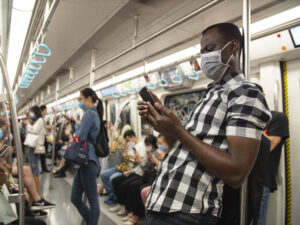The Great Mask Debate

Nearly eight months into a pandemic that has swept the globe, doctors and scientists are making new discoveries about this invisible illness every day. And, now that this disease has permeated into the highest office in the United States, the great debate of mask wearing is gaining traction yet again. The opinions surrounding this issue are strong on both sides. However, many people have scrutinized the President and his staff for not wearing masks possibly resulting in at least thirteen positive cases of COVID-19 in the White House, so far.
But, the question remains: to mask or not to mask?
In the early days of the pandemic, the CDC didn’t urge the general public to wear face coverings in order to guard supplies for the front-line workers. However, with increasing evidence suggesting that the virus is airborne and spread by particles exhaled from people infected with COVID-19, things began to change. Now, there’s hardly a bare face to be seen in any grocery store or other highly trafficked areas.
With conflicting information on the effectiveness of masks, an article from Live Science written by Stephanie Pappas, shares a quote from Ben Cowling, the head of the Division of Epidemiology and Biostatistics at The Hong Kong University. He states “There’s been enough research done to be able to confidently say that masks wouldn’t be able to stop the spread of infection, that they would only have a small effect on transmission, we shouldn’t be relying on masks to help us go back to normal.”
With the growing need to regain a sense of normalcy, many state and local officials have enforced mask mandates for public places and anywhere that may be harder to socially distance. Nina Bai from University of California San Francisco writes, “There are several strands of evidence supporting the efficacy of masks. One category of evidence comes from laboratory studies of respiratory droplets and the ability of various masks to block them. An experiment using high-speed video found that hundreds of droplets ranging from 20 to 500 micrometers were generated when saying a simple phrase, but that nearly all these droplets were blocked when the mouth was covered by a damp washcloth. Another study of people who had influenza or the common cold found that wearing a surgical mask significantly reduced the amount of these respiratory viruses emitted in droplets and aerosols.”
It’s no secret that the topic of mask wearing became a hotly politicized debate. But, politics aside, it appears there is evidence to suggest masking up helps but may not always be as effective as we hoped. Whether you decide to mask up, or not, it’s important that we all do our part to stay safe during this unprecedented moment in history.
Pappas, Stephanie. “Do Face Masks Really Reduce Coronavirus Spread?” Google, Google, 2 June 2020, www.google.com/amp/s/www.livescience.com/amp/are-face-masks-effective-reducing-coronavirus-spread.html.
Bai, Nina. “Still Confused About Masks? Here’s the Science Behind How Face Masks Prevent Coronavirus.” Still Confused About Masks? Here’s the Science Behind How Face Masks Prevent Coronavirus | UC San Francisco, University of California San Francisco, 30 Sept. 2020, www.ucsf.edu/news/2020/06/417906/still-confused-about-masks-heres-science-behind-how-face-masks-prevent.
